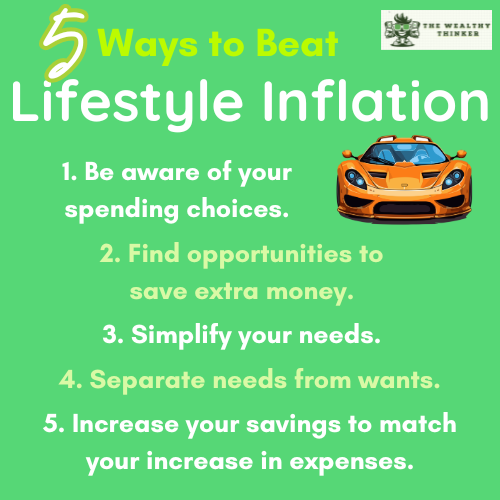Look, it’s easy to fall into the lure of lifestyle inflation.
As soon as we begin to earn more income, we tend to spend more. Since economic power is a reflection of social status, we’re even encouraged to boost our lifestyles to show that we are in a new social class.
So, it feels normal that, as your salary increases you want a better car, to move into a bigger house or expand your wardrobe.
Not to burst your bubble, but this goes against financial common sense.
As we earn more, we should be able to save and invest more because we have a higher disposable income. However, most times, this is not the case.
According to data released by the US Bureau of Labor Statistics, most households continue to spend at least 50% of their income on housing and transport, regardless of how much they earn.

Lifestyle inflation: The unseen enemy
Lifestyle inflation can be sneaky.
Most times, the spending we make to match our income bracket occurs unconsciously. This is because needs are insatiable and constant.
You had those same needs before the extra cash came in, so it’s only logical that you want to sort them as soon as money comes in.
However, lifestyle inflation can REALLY get in the way of your financial independence.
The lure of extra income can come with a false sense of security.
- We feel immune from the old financial troubles which kept us on our toes and forced us to live frugally.
- We believe that the future is now more secure and so, there is little incentive to save and invest in it. After all, we’re on track to have more and more money now, right?
This false sense of financial security can blind us to the reality surrounding the true state of our finances. Most times, when we realize it, it is often too late.
You ask yourself: “Why are my finances still in bad shape when I’m making more money?”
Most of us focus on increasing our income without putting the same effort into learning how to manage it.
Learning how to manage your finances is more important than knowing how to increase it.
Ever heard of a lottery winner that went broke after a few years? It is natural to crave convenience and comfort but you shouldn’t let it come at the expense of our long term goals.
Lifestyle Creep: How Can You Find a Good Balance When You Make More Money?
5 Ways to Beat Lifestyle Inflation
1. Be conscious of your spending choices.
The most obvious place to tackle lifestyle inflation is in our spending.
You need to be conscious of the spending choices you make. Perhaps more importantly, you need to recognize areas where you’ve increased your spending compared to what you were making before and see where to make adjustments.
Paying close attention to your budget can help you with expenses that you don’t need.
Like having dinner at that fancy restaurant every weekend, or taking an extra vacation every year.
As the saying goes, the devil is in the details. This also applies to our spending choices. If you can control your spending, you can tackle lifestyle inflation.
2. Look for every opportunity to save extra money.
Another effective strategy you can use to beat lifestyle inflation is looking for every opportunity to save some extra cash.
- You can buy groceries and provisions in bulk, which reduces the average cost per unit.
- You could consider buying that gadget or car when it’s discounted.
- You could wait for clearance sales to get that designer bag you wanted.
Saving extra cash means you have more to save and invest. It is also a sublime way of maintaining the lifestyle you want at a cheaper price.
3. Try to simplify your needs.
We all have needs, but we are not all willing to pay the same price for those needs.
For example, we all know we need a house, however, we do not all share the same ideas and tastes when it comes to the type of house we want.
While some may need a single-family unit, others may want a 7-bedroom mansion with an exclusive view. Recognizing that a house is a house and that we can’t sleep in more than one bedroom at a time, then this may help to put things into perspective.
4. Separate your needs from wants.
When your income increases, your needs do not increase as much as your wants.
If anything, you experience an exponential increase in the wants you’d like to be satisfied.
For example, we all need to eat, but we all want different food. The irony is that no matter the food we eat, the same purpose is achieved – the satisfaction of hunger.
The desire to eat is the same, but the feeling or taste we want is different.
To tackle lifestyle inflation, you should be able to sift your needs from your wants. If you want to pay extra for something, ask yourself if you want it or need it.
Even if you think you need it, try to clarify why. This in essence lets you know what value you would derive from that added luxury you want to acquire.
5. Increase your savings to match your increase in expenses.
This is a trade-off strategy that can enable you to have the best of both worlds – a more comfortable lifestyle, with increased financial independence.
Not all expenses which accompany an increase in income can be undone.
For example, you may decide to marry or have kids because you believe that you’re more financially secure. These actions come with extra responsibilities and thus extra expenses.
You can compensate for these extra responsibilities by equally increasing the percentage of our income you choose to save and invest.
The routine of having to continually invest also acts as a check on your expenses and ultimately reduces the effects of lifestyle inflation.
Alternatively, you can go further by allocating a percentage increase to your savings if your expenses increase by a certain percentage.
For example, for every 10% increase in your expenses, you can allocate a 5% increase in savings and investments.
You can decide to take out a mortgage and pay towards having a home rather than renting apartments. This trade-off ensures that you’re not shortchanging yourself.
Final Word
Lifestyle inflation is an unseen enemy that can easily derail you from achieving your long-term financial goals.
We like to think that the flush times will last forever so we get lackluster towards saving and investing.
The false sense of financial security offered by a more convenient lifestyle can leave us exposed to unforeseen circumstances.
If you can identify lifestyle inflation, you can reach your financial targets faster because you can afford to (And plan to) put the extra money to work for you.
This means that even when you start bringing home more money, you still have to discipline yourself mentally to be able to be financially smart and keep planning for the future.
This has more to do with your financial behavior than your ability to generate more money.
By following the steps outlined above, you can reduce the effects of lifestyle inflation on your life.
Editor’s note: This article was originally published Aug 25, 2021 and has been updated to improve reader experience.


















